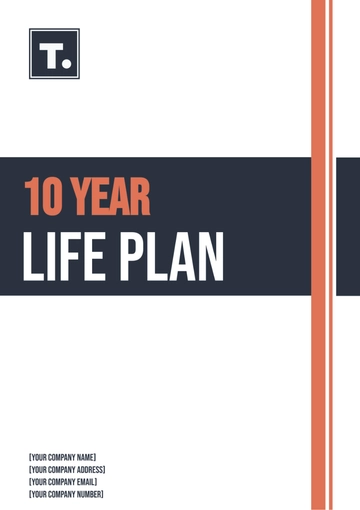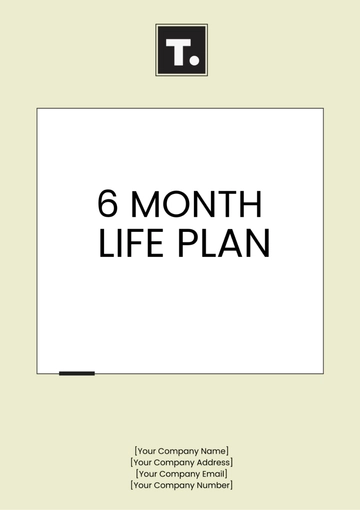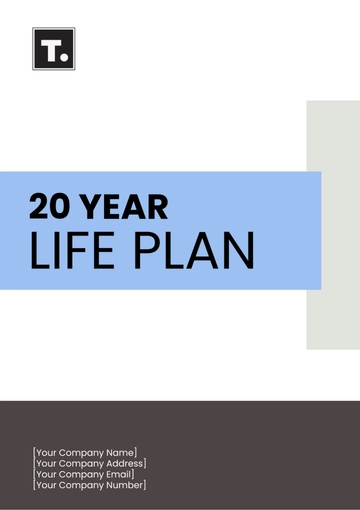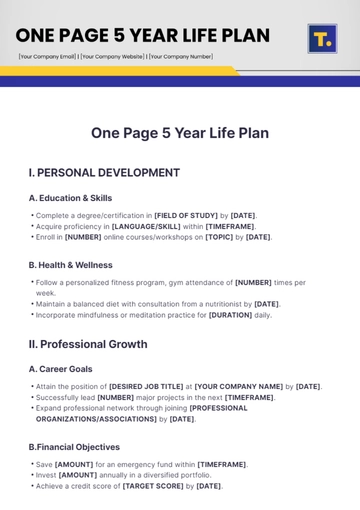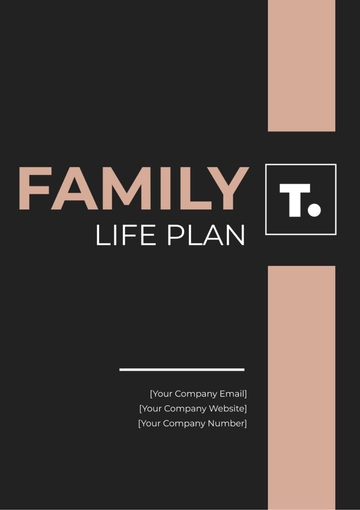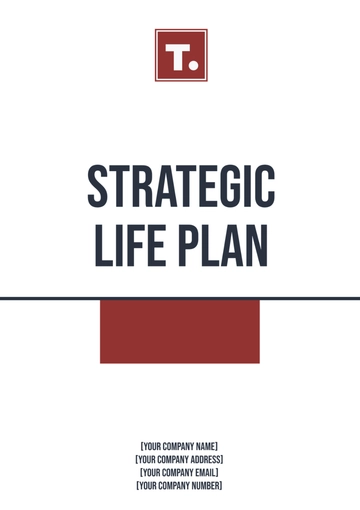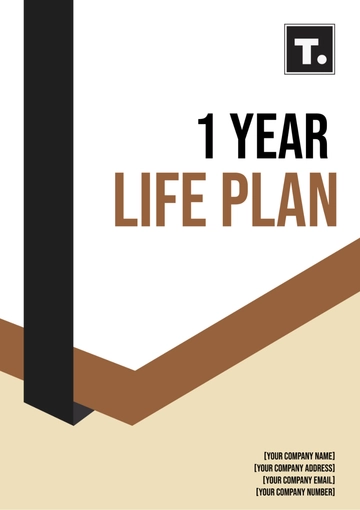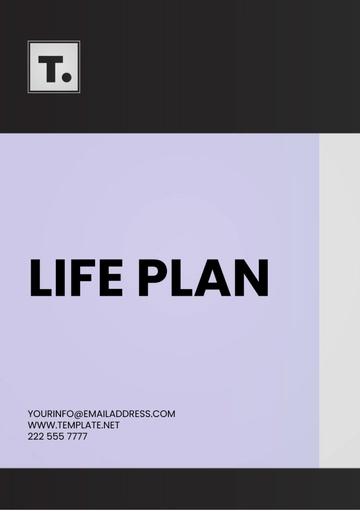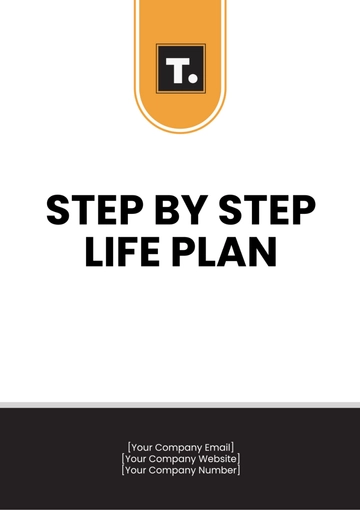Free Life Plan
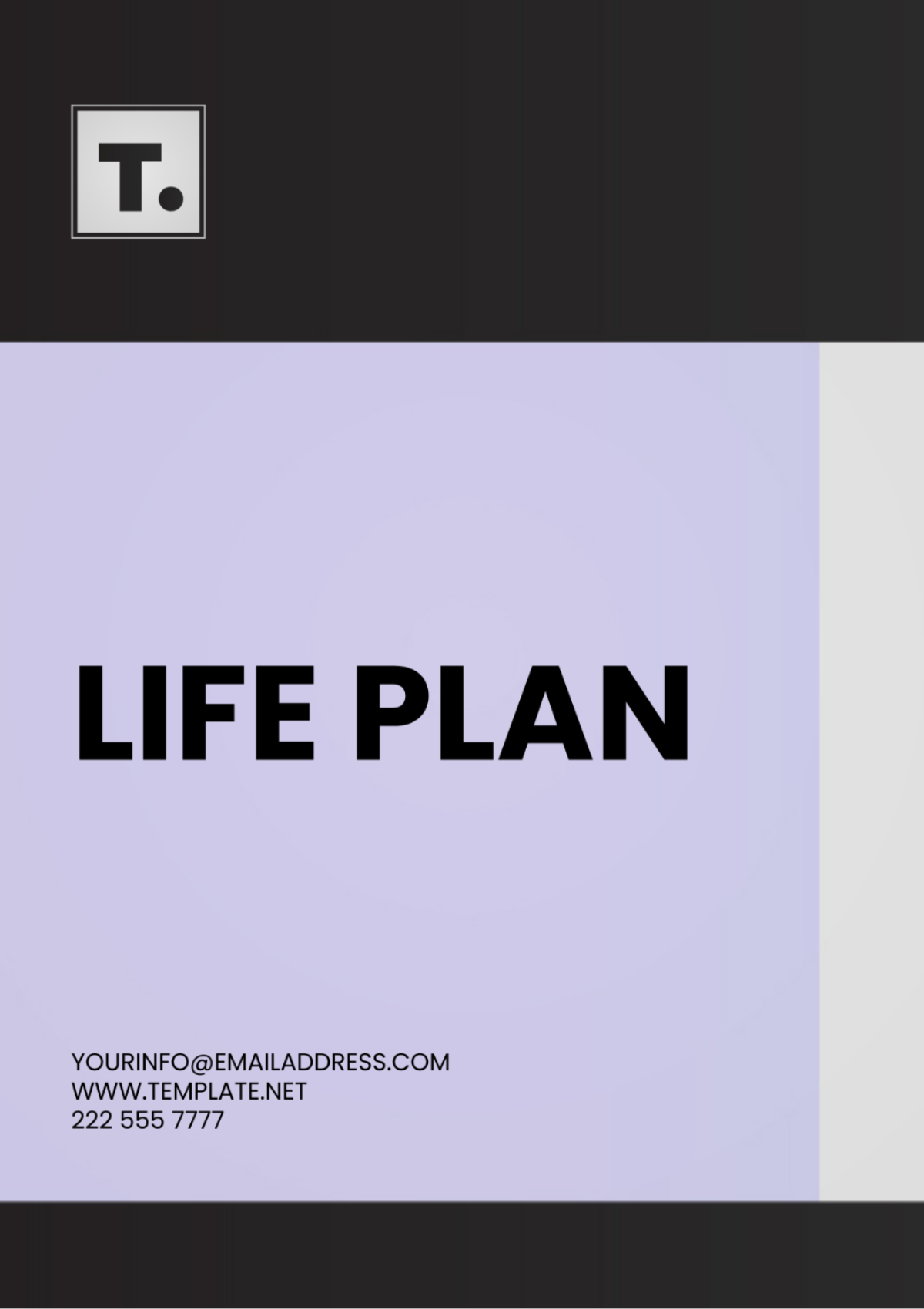
I. Personal Information
1. Basic Details
Name: [YOUR FULL NAME]
Date of Birth: [YOUR DATE OF BIRTH]
Gender: [YOUR GENDER]
Contact Information: [YOUR CONTACT INFORMATION]
2. Family Information
Spouse/Partner Name: [SPOUSE/PARTNER NAME]
Children:
Name: [CHILD NAME 1], Date of Birth: [CHILD DOB 1]
Name: [CHILD NAME 2], Date of Birth: [CHILD DOB 2]
3. Emergency Contacts
Name: [EMERGENCY CONTACT NAME 1], Relationship: [RELATIONSHIP 1], Phone: [CONTACT PHONE 1]
Name: [EMERGENCY CONTACT NAME 2], Relationship: [RELATIONSHIP 2], Phone: [CONTACT PHONE 2]
II. Professional Goals
1. Short-Term Goals (1-2 years)
Secure a new job in [YOUR DESIRED INDUSTRY]:
Apply for positions at companies such as [COMPANY NAME]. Tailor my resume and cover letter to highlight experience in [SPECIFIC SKILLS OR AREAS]. Attend industry networking events such as [EVENT NAME] and [EVENT NAME] to connect with professionals in the field.
Complete [PROFESSIONAL CERTIFICATION/COURSE]:
Enroll in [CERTIFICATION/COURSE NAME] offered by [INSTITUTION/PLATFORM]. Allocate [NUMBER] hours per week for studying and completing coursework. Utilize resources such as [TEXTBOOK/ONLINE MODULES] to supplement learning.
Network with [INDUSTRY PROFESSIONALS/ORGANIZATIONS]:
Join [PROFESSIONAL ORGANIZATION NAME] and attend monthly meetings. Schedule informational interviews with professionals in roles such as [JOB TITLE] at companies like [COMPANY NAME] and [COMPANY NAME]. Connect with industry peers on platforms like LinkedIn and participate in relevant discussions and groups.
2. Mid-Term Goals (3-5 years)
Achieve a managerial or senior position in [YOUR COMPANY/FIELD]: Express interest in leadership opportunities during performance reviews with my manager. Complete leadership training programs offered by [COMPANY NAME] or external organizations like [LEADERSHIP PROGRAM NAME]. Seek mentorship from senior leaders in the company, such as [MENTOR'S NAME].
Earn a [DEGREE/MASTER’S DEGREE] in [YOUR FIELD OF STUDY]:
Research online degree programs offered by institutions such as [UNIVERSITY NAME] and [UNIVERSITY NAME]. Set aside savings of [AMOUNT] for tuition and related expenses. Create a study schedule that accommodates work commitments and personal obligations.
Mentor aspiring professionals in [YOUR INDUSTRY]:
Volunteer as a mentor for programs such as [MENTORSHIP PROGRAM NAME] or [COMMUNITY ORGANIZATION NAME]. Offer to speak at career development events hosted by [UNIVERSITY NAME] and [PROFESSIONAL ORGANIZATION NAME]. Share insights and advice on platforms like LinkedIn through articles and posts targeting aspiring professionals.
3. Long-Term Goals (5+ years)
Start and grow a business in [YOUR INDUSTRY]
Establish a recognized professional presence
Contribute to significant industry advancements
III. Financial Goals
1. Financial Milestones
Build an emergency fund with at least [X] months' worth of expenses:
Calculate target amount based on monthly expenses of [AMOUNT].
Set up automatic transfers of [AMOUNT] per month to high-yield savings account.
Reevaluate emergency fund target every [TIME FRAME] to adjust for changes in expenses or income.
Pay off [Student Loans/Credit Card Debt/Mortgage]:
List debts including balances, interest rates, and minimum payments.
Choose a debt repayment strategy ([DEBT SNOWBALL/DEBT AVALANCHE]) based on preference.
Allocate [EXTRA AMOUNT] from monthly budget towards debt repayment.
Celebrate milestones such as paying off [SPECIFIC DEBT] to stay motivated.
Save for a down payment on a home:
Determine target down payment amount for homes in [LOCATION].
Set a timeline to save [TARGET AMOUNT] within [TIME FRAME].
Increase savings by [INCREASE AMOUNT] each month through budget adjustments or additional income sources.
Research first-time homebuyer programs and grants available in [LOCATION].
2. Investment Goals
Invest in a diverse portfolio with a focus on [Stocks/Real Estate/Mutual Funds]:
Research asset allocation strategies and determine risk tolerance.
Allocate [PERCENTAGE] of investment portfolio to [ASSET CLASS] to achieve diversification.
Rebalance portfolio annually or when allocation deviates by [PERCENTAGE] from target.
Monitor market trends and adjust portfolio based on performance and goals.
Contribute [X]% of income to retirement accounts:
Calculate retirement savings goal based on desired retirement age and income.
Maximize contributions to employer-sponsored retirement plans such as [401(K)] to take advantage of employer match.
Consider opening and contributing to individual retirement accounts (IRAs) to supplement retirement savings.
Increase contributions by [PERCENTAGE INCREASE] annually or whenever income rises.
Explore opportunities for passive income:
Research passive income streams such as [REAL ESTATE INVESTING/DIVIDEND STOCKS/ONLINE BUSINESS].
Start with a small investment of [INITIAL INVESTMENT] and reinvest profits to grow income stream.
Dedicate [AMOUNT OF TIME] per week to manage and grow passive income sources.
Seek advice from mentors or join communities of passive income earners to learn best practices.
IV. Health & Wellness
1. Physical Health
Maintain a balanced diet:
Create a meal plan focused on whole foods such as [FRUITS], [VEGETABLES], lean proteins, and whole grains.
Monitor portion sizes and limit intake of processed foods, sugary snacks, and high-fat items.
Stay hydrated by drinking plenty of water throughout the day and limit intake of sugary beverages.
Exercise regularly (at least [X] times a week):
Design a workout schedule that includes a mix of cardiovascular exercises, strength training, and flexibility exercises.
Choose activities you enjoy such as [ACTIVITY 1], [ACTIVITY 2], [ACTIVITY 3] to make exercise enjoyable and sustainable.
Set realistic goals and track progress to stay motivated and accountable.
Attend annual physical exams and screenings:
Schedule regular check-ups with healthcare providers to monitor overall health and detect any potential issues early.
Stay up-to-date with vaccinations, screenings, and preventive care recommended for your age and gender.
Keep a health journal to record appointments, test results, and any changes in health status.
2. Mental Health
Schedule regular therapy or counseling sessions:
Research and connect with a licensed therapist or counselor who specializes in areas such as [THERAPY TYPE 1], [THERAPY TYPE 2], or [THERAPY TYPE 3].
Prioritize mental health appointments as part of your overall wellness routine, just like you would for physical check-ups.
Be open and honest during sessions, discussing any concerns or challenges you may be facing.
Practice mindfulness and stress-relief techniques:
Incorporate mindfulness practices such as meditation, deep breathing exercises, or progressive muscle relaxation into your daily routine.
Take regular breaks throughout the day to step away from work or responsibilities and focus on the present moment.
Identify triggers for stress and develop coping strategies such as [COPING STRATEGY 1], [COPING STRATEGY 2], or [COPING STRATEGY 3].
Engage in hobbies and activities that promote relaxation:
Dedicate time each week to activities you enjoy, whether it's [HOBBY 1], [HOBBY 2], [HOBBY 3], or spending time with loved ones.
Prioritize self-care activities such as taking long baths, getting massages, or indulging in your favorite hobbies.
Create a relaxing environment at home with soothing colors, comfortable furniture, and soft lighting to encourage relaxation and rejuvenation.
V. Personal Development
1. Education & Skills
Attend workshops and seminars in [YOUR FIELD]
Read at least [X] books per year about [PERSONAL INTREST/PROFESSIONAL DEVELOPMENT]
Develop a new skill such as [CODING/LANGUAGES/PUBLIC SPEAKING]
2. Personal Growth
Set and review personal goals quarterly:
Reflect on achievements and adjust goals as needed.
Use tools like [GOAL-TRACKING APPS] or journals to stay organized.
Seek feedback from mentors or peers for insights.
Travel to at least [X] new destinations each year
Volunteer for [CHARITY/CAUSE/COMMUNITY SERVICE]
VI. Social & Relationships
1. Building Relationships
Allocate quality time for family and friends
Join social groups or clubs related to [YOUR INTRESTS]
Build and maintain a professional network
2. Community Involvement
Participate in community events and activities
Contribute to local initiatives and projects
Be an active member of [LOCAL ORGANIZATIONS/GROUPS]
VII. Achievements & Milestones
1. Documenting Success
Track key milestones annually
Celebrate personal and professional achievements
Regularly update and review your life plan
VIII. Conclusion:
In conclusion, crafting a comprehensive life plan is essential for achieving personal and professional fulfillment. By establishing clear goals and actionable steps in various areas of life, individuals can navigate their journey with purpose and intentionality. From setting professional aspirations to nurturing relationships, maintaining health and wellness, and fostering personal growth, a well-rounded life plan provides a roadmap for success and fulfillment. Regular review and adjustment of the plan ensure alignment with evolving priorities and aspirations. With dedication, perseverance, and a commitment to continuous improvement, individuals can realize their dreams and lead a fulfilling and meaningful life.
- 100% Customizable, free editor
- Access 1 Million+ Templates, photo’s & graphics
- Download or share as a template
- Click and replace photos, graphics, text, backgrounds
- Resize, crop, AI write & more
- Access advanced editor
Unlock your future potential with Template.net's Life Plan Template. This editable and customizable tool empowers you to map out your goals, aspirations, and milestones with ease. Crafted for simplicity and flexibility, it's fully editable in our Ai Editor Tool, ensuring your life's blueprint reflects your unique journey.
You may also like
- Finance Plan
- Construction Plan
- Sales Plan
- Development Plan
- Career Plan
- Budget Plan
- HR Plan
- Education Plan
- Transition Plan
- Work Plan
- Training Plan
- Communication Plan
- Operation Plan
- Health And Safety Plan
- Strategy Plan
- Professional Development Plan
- Advertising Plan
- Risk Management Plan
- Restaurant Plan
- School Plan
- Nursing Home Patient Care Plan
- Nursing Care Plan
- Plan Event
- Startup Plan
- Social Media Plan
- Staffing Plan
- Annual Plan
- Content Plan
- Payment Plan
- Implementation Plan
- Hotel Plan
- Workout Plan
- Accounting Plan
- Campaign Plan
- Essay Plan
- 30 60 90 Day Plan
- Research Plan
- Recruitment Plan
- 90 Day Plan
- Quarterly Plan
- Emergency Plan
- 5 Year Plan
- Gym Plan
- Personal Plan
- IT and Software Plan
- Treatment Plan
- Real Estate Plan
- Law Firm Plan
- Healthcare Plan
- Improvement Plan
- Media Plan
- 5 Year Business Plan
- Learning Plan
- Marketing Campaign Plan
- Travel Agency Plan
- Cleaning Services Plan
- Interior Design Plan
- Performance Plan
- PR Plan
- Birth Plan
- Life Plan
- SEO Plan
- Disaster Recovery Plan
- Continuity Plan
- Launch Plan
- Legal Plan
- Behavior Plan
- Performance Improvement Plan
- Salon Plan
- Security Plan
- Security Management Plan
- Employee Development Plan
- Quality Plan
- Service Improvement Plan
- Growth Plan
- Incident Response Plan
- Basketball Plan
- Emergency Action Plan
- Product Launch Plan
- Spa Plan
- Employee Training Plan
- Data Analysis Plan
- Employee Action Plan
- Territory Plan
- Audit Plan
- Classroom Plan
- Activity Plan
- Parenting Plan
- Care Plan
- Project Execution Plan
- Exercise Plan
- Internship Plan
- Software Development Plan
- Continuous Improvement Plan
- Leave Plan
- 90 Day Sales Plan
- Advertising Agency Plan
- Employee Transition Plan
- Smart Action Plan
- Workplace Safety Plan
- Behavior Change Plan
- Contingency Plan
- Continuity of Operations Plan
- Health Plan
- Quality Control Plan
- Self Plan
- Sports Development Plan
- Change Management Plan
- Ecommerce Plan
- Personal Financial Plan
- Process Improvement Plan
- 30-60-90 Day Sales Plan
- Crisis Management Plan
- Engagement Plan
- Execution Plan
- Pandemic Plan
- Quality Assurance Plan
- Service Continuity Plan
- Agile Project Plan
- Fundraising Plan
- Job Transition Plan
- Asset Maintenance Plan
- Maintenance Plan
- Software Test Plan
- Staff Training and Development Plan
- 3 Year Plan
- Brand Activation Plan
- Release Plan
- Resource Plan
- Risk Mitigation Plan
- Teacher Plan
- 30 60 90 Day Plan for New Manager
- Food Safety Plan
- Food Truck Plan
- Hiring Plan
- Quality Management Plan
- Wellness Plan
- Behavior Intervention Plan
- Bonus Plan
- Investment Plan
- Maternity Leave Plan
- Pandemic Response Plan
- Succession Planning
- Coaching Plan
- Configuration Management Plan
- Remote Work Plan
- Self Care Plan
- Teaching Plan
- 100-Day Plan
- HACCP Plan
- Student Plan
- Sustainability Plan
- 30 60 90 Day Plan for Interview
- Access Plan
- Site Specific Safety Plan
